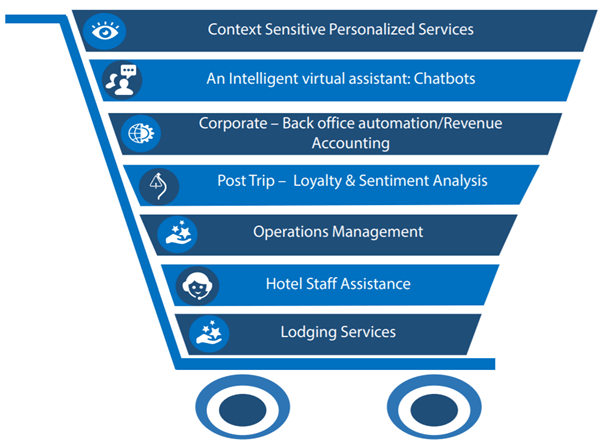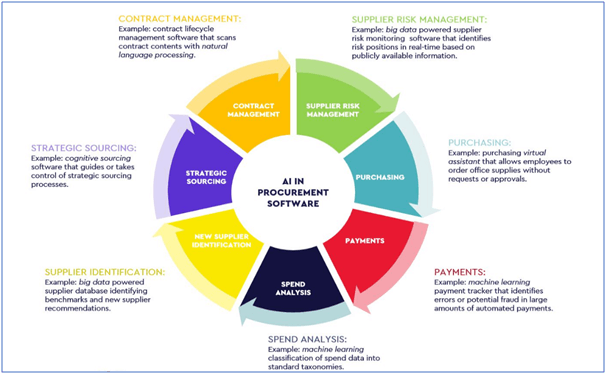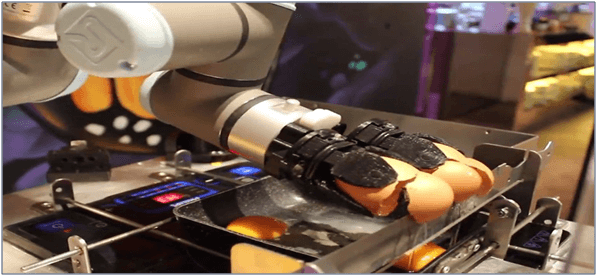With the 4.0 digital era industry now, digital and AI are interconnected. AI is cutting down repeated tasks by simulating human intelligence in machines. AI helps procurement specialists to solve complex problems and enormous data more effectively by using software applications and smart computer algorithms. These machines are automated to think, to act, to behave like human behaviors.

Table of Contents
Understanding Artificial Intelligence
AI has two subcategories, Machine Learning (ML) and Natural Language Processing (NLP). ML is a type of system that able to pick up and learn from big data. Deep learning, which is commonly used in ML, and the other three learnings are: supervised learning, unsupervised learning, and reinforcement learning. NPL is a kind of technology assistance computers to understand the human’s natural language.
Robotic Process Automation (RPA) offers procurement specialist numerous opportunities to increase process efficiency, reduce recurring tasks, and to streamline the whole process. RPA is a software robot that automates repeated tasks that human beings have accomplished, while AI achieves tasks that require human intelligence.
Adopting Artificial Intelligence (AI) Technology
Applications of AI Technology will bring a lot of benefits to procurement and the organization. The benefits of AI can be categorised into 3 major areas:
- – With AI technology, it could provide better interfaces for operations, inter-departments, humans, and machines. AI able to solve complex problems, which is much beyond human intelligence. Some of the common AI applications in the market include detecting cards, bar codes, fingerprints, and face recognition. AI can work faster on radical decisions and computation since there is no intervention of human emotions.
- – It’s a perfect replacement for repetitive and laborious tasks, which could cut down a lot of manpower costs, and also solve the lean manpower issue. AI does not require any breaks or rests even “working” under tremendous pressure. Hence, it can perform and run the tasks continuously. This will enhance the efficiency and performance of the organization.
- – AI is all about data, thus, AI can handle all types of information and data records. With AI data analysis, it could lower the chances of the errors made by humans and increase the accuracy of information.
Challenges for AI Adoption
Lack of necessary skills, knowledge, and expertise in this area are the challenges for AI adoption. Certain aspects of AI adoption require data professionals’ technical expertise.The technical structure might not be able to support the necessary quantity of data that the organization requires. To promote better visibility, both top-down and bottom-up approaches must be embraced.The organization must always have a clear direction and communication across the board. Without clear communication, it will result in “vague vision”. It would be very challenging to predict the worth and value of AI could bring to the organization.
AI in Procurement Software
AI in Procurement software could support procurement specialists in the whole procurement cycle.
- Big data are often utilized to monitor the potential supplier risk.
- – To have the potential savings opportunities on the legal contracts. By adopting NPL, it allows the contract management software to robotically scan and interpret the legal documents for better results. For example, Seal Software.
- – By using Machine Learning (ML) for the eSourcing of raw materials. For example, Keelvar e-sourcing.
- – Purchasing software that adopts AI can make the purchase orders approve at anytime and anywhere.
- – Big data enables new ways to identify, manage, and utilize supplier data.
- – Using ML in accounts payable automation can make the invoices payment flow faster and also to detect potential frauds.
- – Machine Learning (ML) will help to enhance and speed up several processes such as spend analysis, spend classification, and vendor matching.

AI for Robotics Technology
AI and robotics are closely connected to each other. AI has become very common in robotic solutions, flexibility, and learning capabilities.
- AI is a very useful tool to do robotic assembly applications. It also can help with a real-time course correction. AI can help a robot to learn its way which can produce better results and processes when it comes to operation.
- AI application on robotic packaging is very common nowadays, especially in the manufacturers’ industry such as food packing. It could make the packing faster, efficient, accurate, which will subsequently lower costs example, saving on the labour cost.
- This is commonly adopted in the hospitality industry. Hotels and restaurants are using robots to enhance guest experience and customer service. Robots can interact in more human ways and the interaction between humans and robots brings interesting and unique memories.
- This is to guide and teach the robots to perform some specific and custom tasks.


AI Shaping Hotels in to Smart Hotel
At the front office, AI-enabled chat-bots interact with guests and answer their questions instantly, reducing waiting times. Such function helps the hotels to monitor frequently asked questions and interactions so that staff can better anticipate enquiries in the future.

With automated face recognition self-check-in/out kiosk, it allows guests to check-in and check-out anytime at their convenience. The hotel can utilize the guests’ data for marketing purposes and also to understand the trend behaviour.

Implementing smart service from F&B. For example, YOTEL Singapore’s friendly in-room amenities robots, Yoshi and Yolanda, which provide guest room service. This makes the F&B operations more efficient by reducing the manpower running up and down while the staff can focus more on their main role.

Implementing smart service at the kitchen or for banquet, could help to identify and learn what types of food are wasted so that chefs can plan how much to cook in order to maintain the quality of foods. For example, egg-cooking robot serving omelets in M Social Singapore.

AI in hotel engineering could help the engineer to analyse and find the root causes of defects. They can help to reduce the operating costs such as reduction in energy and water consumption with preventive maintenance. For example, preventive maintenance on the HVAC system.
AI in Security could detect suspicious activities and send automatic alerts to staff for further verification. For example, in FlyZoo Hotel in Hangzhou, China (Alibaba group), and guests must have their faces scanned when they check-in and be authenticated by cameras in the lifts and their hotel room door before entering the room.
The full content is only visible to SIPMM members
Already a member? Please Login to continue reading.
References
Claire Carroll, (2019). “Data Basics – Scaling AI.” Retrieved from https://blog.dataiku.com/the-top-7-ai-adoption-challenges/, accessed 4/12/2020.
Gangboard.com, (2019). “Artificial Intelligence Vs IoT.” Retrieved from https://www.gangboard.com/blog/artificial-intelligence-vs-iot#what%20is%20ai/, accessed 4/12/2020
Kalyar Thiri Maung, ADPSM.(2020). “AI Technologies for Digital Procurement” Retrieved from SIPMM: https://publication.sipmm.edu.sg/ai-technologies-digital-procurement/, accessed 2/12/2020.
Margaret Ng, ADPSM. (2020). “Crucial Applications for Procurement Artificial Intelligence.” Retrieved from SIPMM: https://publication.sipmm.edu.sg/crucial-applications-procurement-artificial-intelligence/, accessed 2/12/2020.
Robotic Industries Association, (2008). “How Artificial Intelligence is Used in Today’s Robots.” Retrieved from https://www.robotics.org/blog-article.cfm/How-Artificial-Intelligence-is-Used-in-Today-s-Robots/117/, accessed 5/12/2020.
Sievo, (2020). “AI in Procurement.” Retrieved from https://sievo.com/resources/ai-in-procurement/, accessed 3/12/2020.
Singapore Hotel Association and Singapore Tourism Board, (2019). “Smart Hotel Technology Guide 2019”. Retrieved from https://www.stb.gov.sg/content/dam/stb/documents/industries/hotel/Smart%20Hotel%20Technology%20Guide%202019.pdf/, accessed 5/12/2020.
Sylvia Lee, GDPM, (2017). “Artificial Intelligence Revolutionize Procurement.” Retrieved from SIPMM:https://publication.sipmm.edu.sg/how-artificial-intelligence-revolutionize-procurement/, accessed 2/12/2020.


